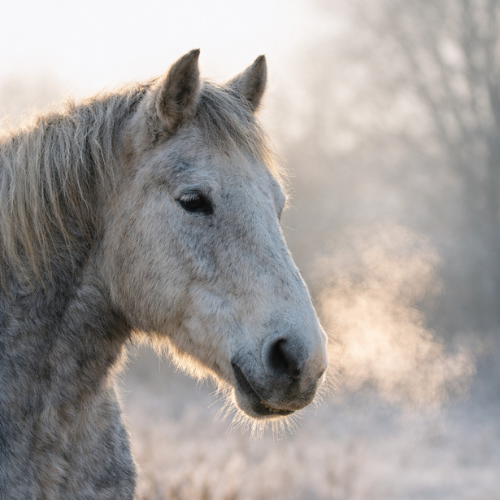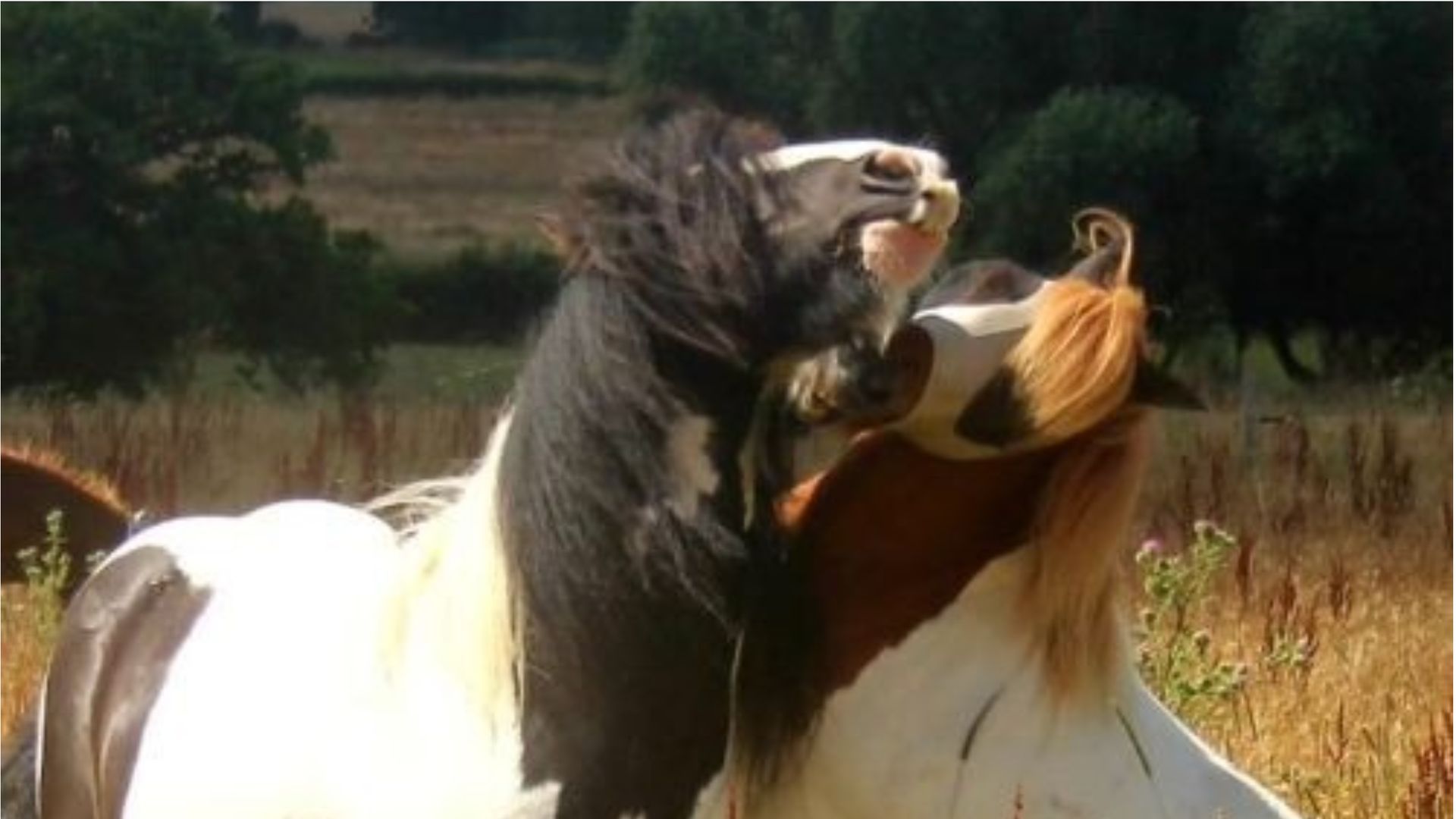The Bitter Reflex
The magic of Bitter Herbs
It's that time again - the spring grass effect when our horses are switching from a winter on stemmy, fibre-rich hay to an abundance of fresh, juicy green grass shoots. We've all seen the radical changes in what comes out the other end - loose, watery, 'cow splat'💩, caused by the sudden high percentage of sugary neon-green grass blades which are 60% higher in water content than hay, and with a significant reduction in cellulose fibre than what our horses have been on all winter with hay as their forage. And no surprise - it's a lot for the hindgut to get used to after a winter on hay, and can cause major disruption in the gut biome.
It's simple enough to reverse by restricting access to the green stuff and keeping an adlib hay supply passing through the hindgut, but what can also help is a short-term course of feeding 'bitter' herbs.
Historically, bitter herbs have been used as cleansing agents, vitality builders and digestive support, yet for us humans, bitter flavours tend to be a bit tricky to get down. The good news is that our horses don’t necessarily agree with us, which is just as well because bitter herbs offer real benefits to improve overall health.
The term ‘bitters’ is a generic term for a collective of secondary plant metabolites (SPM’s) that have a bitter flavour, literally. (For the herb nerds out there, these compounds include iridoids, sesquiterpene lactones, sesquiterpene hydrocarbons, monoterpene iridoids, alkaloids and volatile oils). SPM’s are basically part of the plant's self-defence mechanism against fungal microbes, oxidative damage and predators such as us humans and insects. They’re designed for us not to like the taste of them - it’s all about survival of the species 😉.
Yet many bitters have also been shown to have antifungal, antiseptic, antiprotozoal and even antitumour activity, which from a phytonutrient fan’s viewpoint is exciting stuff! Just as these bitter compounds help protect the plant, they can also help the mammalian body to inhibit pathogen microbe growth, oxidation and inflammation - what's not to love?!
However, where the real bitter magic happens is in the gut, and as we know only too well, these days the subject of equine gut support is a hot topic. One of the most basic benefits of bitters is the fact that they improve nutrient extraction and absorbability - nutrition, after all, is the foundation upon which health is built, and anything that helps the body make use of the nutrients is a good thing.
Overall, bitters have a genuine stimulating and tonifying effect on the digestive system, generally known as 'the bitter reflex’, which is literally triggered by the actual 'bitter' taste on the tongue. Top tip for us humans though - it's pointless trying to cheat by taking them in capsules to try and bypass the taste receptors - this they simply won’t work as it’s all about that bitter taste triggering the reactions 😉.
The Bitter Reflex - how it works
So what happens when we taste bitters? Cue the release of a hormone called gastrin, which in turns supports and strengthens digestive function by stimulating the secretion of the foregut digestive juices:
- Saliva, where it all begins.
- Hydrochloric (stomach) acid, which triggers protein digestion and enhances mineral absorption. It also helps destroy harmful microbes, so taking bitters prior to eating not only prepares the stomach for digestion, but it may also offer some protection against food-borne contaminants. (Hence why stomach acid is so important and should never be 'switched off' with PPIs if our horses get gastric ulcers).
- Pepsin, the first digestive enzyme that food meets in the stomach/foregut that breaks protein molecules into amino acids.
The bitter reflex also stimulates appetite, preparing the gut for the receipt of food by triggering contractions in the small intestine. For us humans, this is why we should take bitters 30-minutes before food, but there’s no reason not to give our horses a handful of bitter herbs, i.e. dandelion leaves and roots, a short time before their feedbowl, especially if you’re struggling with poor appetite or loss of weight/condition.
For acid-related symptoms, the bitter reflex also causes the oesophageal sphincter to contract (this is what connects the base of the oesophagus with the entrance to the stomach/foregut), which prevents stomach acid from migrating up through the oesophagus, aka acid reflux.
Even better, the reflex stimulates self-repair mechanisms in the pancreas and intestinal wall, which is another reason why bitters mean an improved, strengthened digestive function. This could also mean that bitters could be helpful in the prevention and/or treatment of leaky gut, which as we all know can cause a significant increase in inflammation, allergies and autoimmune diseases; note I say ‘could also mean’ because currently there are no studies to prove this, but it’s thought of as a reasonable theory.
As for gassy guts, well, bitters truly excel here! By helping the digestion process break the food molecules down into units the body can actually absorb, gas formation is prevented. Friendly microbes in the small intestine are also able to properly break down those units even further, which also prevents gas formation.
Bitters are also considered cooling, so beneficial for ‘hot’ conditions, i.e. inflammation (including arthritic symptoms), tension, fever. Other indications for bitters include chronic candidiasis, thyroid dysfunction and allergic conditions such as asthma and urticaria. As per the European Journal of Herbal Medicine, bitters have ...
"... a general tonic effect, exciting the sympathetic nervous system and improving cardiac function by decreasing heart rate and cardiac stroke volume. They stimulate muscles and improve circulation to abdominal organs. Some bitters have an antidepressant effect. Some are emmenagogues. Quinine (an alkaloid of cinchona) was the standard anti-malarial for years, and new malaria research is currently being done on both gentian and wormwood."
And Weston A. Price reports that ...
"Taken over time, they will lessen symptoms of poor digestive function such as gas and bloating, constipation, loose stools and food allergies; enhance vitamin and mineral absorption; promote balanced blood sugar levels … protect the liver and strengthen eliminatory function; heal inflammatory damage to the gut wall; and reduce the incidence of allergic disorders. In short, the daily use of bitters can address some of the most rampant and heavily medicated health conditions of our time."
Contraindications
Of course, as with all things, while generally safe when taken as directed, bitters are contraindicated for:
- Pregnant or nursing mares.
- Chronic gastric ulcerogenic conditions until they're under control.
- Chronic respiratory congestion.
- A depressed metabolism.
Also, while side effects are rare, you may see the ‘Feel worse before feeling better’ reaction (Herxheimer’s - see the bottom of our Detoxification page for the full explanation), usually due to an effective detoxification which the exit routes then struggle to excrete quickly enough. There may also be side effects from excess absorption of any vet meds being taken, as bitters will increase the absorption rate of not only phytonutrients, but also pharmaceuticals.
The general message is not to feed at overly high dosages as bitters may have the opposite effect of what they're meant to do, i.e. inhibit gastric secretions and suppressing appetite rather than improving it.
How to feed/take bitters
Historically us humans would take bitters before mealtimes as an aperitif or pre-dinner cocktail, made with a dash of bitter herbs such as angostura, although probably not a great plan for beloved Ned ... Another easy way for us humans to get more bitters into the diet is to simply add more bitter greens to a salad, i.e. dandelion leaves, arugula, radicchio and endive, and eating the salad first.
And, would you believe, chamomile’s a bitter. Yes, I promise you I said that – chamomile’s a bitter! Thing is, us humans tend not to make it properly for the bitter benefits, because we usually just dunk a teabag a couple of times, squeeze it out and serve. This doesn't make a beneficial herbal tea – this is just flavoured water. To get the benefits we need to infuse those herbs, covered, for at least 5-8 minutes. Which means it’s going to taste really strong and, let’s be honest, not that palatable either. But if you infuse the chamomile correctly, you’ll get a ‘bitter’ taste, and that’s what you want for it to do its thing.
Chamomile also has a natural probiotic effect, and is even thought to prevent Ibuprofen damage to the stomach. It used to be so much a part of our culture that even Beatrix Potter sent Peter Rabbit to bed with chamomile after he messed around in MacGregor’s garden.
For our horses, perhaps my favourite bitter is the humble dandelion, particularly the root which has the added advantage of being a prokinetic – a funky word that means it enhances the motility of good digestion. It not only acts as a bitter, priming all the digestive juices, but it also makes things move through the stomach a bit quicker so the digesting foodstuff won't get stuck in the intestines and start to rot. Dandelion root also contains inulin which is a natural prebiotic, so it nurtures and nourishes all the good stuff inside.
Another excellent prokinetic is ginger. Remember, though, that ginger is considered ‘hot’, so if there’s inflammation present, it’s best not to feed until the inflammation is under control.
I also love burdock, oregano, artemesia, and one of my favourite all-round herbs, the wonderful yarrow, with a final sprinkling of fennel for its carminative (anti-gas) effects, plus psyllium to help bind that spring 'looseness' and firm up the spring grass effect. All combined with both dandelions in our GutBitters blend to help support our horses through the spring grass effect.
So there we have it - here’s to a life well digested, with a bitter taste in the mouth 😉











